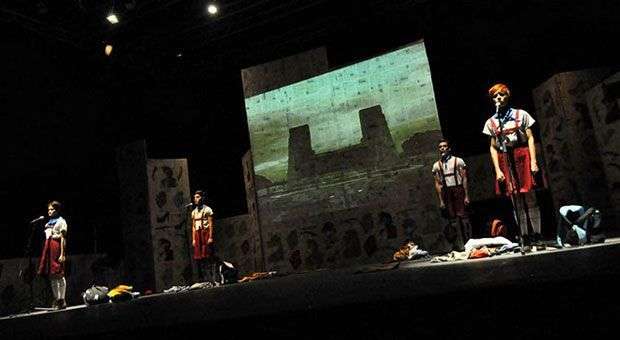The gray car will first come to Havana. The projection of a 1919 silent film – which tells the story of a band of thieves, serves as background to the live performances, to weave a range of intertexts that shaped one of the proposals of the Latin American and Caribbean Season Theatre which will take place from May 16 through the 25 in several Cuban cities.
Inspired by the Japanese tradition benshi Theatre, Teatro de Ciertos Habitantes, brings to the insular space a Mexican production that has had more than 500 functions. Since its premiere in 2002, it has been presented in Japan, Germany, Egypt, Poland and Latin American countries. On these interstices between different artistic expressions and crosses (generic, geographic, aesthetic) the next edition of Theatrical May will focus, an event organized every two years by Casa de las Américas.
Through the discursive polyphony and disassembled scaffolding structure and tradition are still moving the creative boundaries, often with the idea of questioning the political-social and of deepening into the construction of the imaginary environment of our continent. In this edition of the event, the Brazilian actor Narciso Telles takes two-person scene. The first-Potestad, authored by the Argentine Eduardo Pavlovsky- speaks about the complexity of the repression, the aftermath of the military dictatorship and fractures of the family environment in that context. In Memorial de silencios y margaritas it is intertwine Eduardo Galeano´s writing with non-theatrical texts sources that reinforce the political content of the themes addressed in the scene.
Also in Cuba will be Boa Companhia from Brazil which since 1992 reviewed and transgresses the boundaries between theater, dance, music, circus and visual. An exile, a father, a young cartographer, a jester, shaman and native warriors armed the plot of Cartas al paraíso, a look into the history of Brazil and the meeting of two different cultures to raise issues that are not immune to the current times.
From Cochabamba will come Kikinteatr with a proposal based in performative concepts, the use of new technologies and the visual arts. Its founder, Diego Aramburo, becomes one of the most important creators of the performing arts in Bolivia. The question before the loss of roots and the condition of “marginalized” man in the Latin American context, is the proposal that articulates the Bolivian group, Teatro de los Andes. Immigrants who leave their home communities and the problematic relation with the urban dynamics focus the history Hamlet de los Andes, “appropriation” of the classic codes from our regional reality.
With Cartel mayo14 with the National Contemporary Dance Company, from the Dominican Republic, the public can get to know a project that represents the various shades of Caribbean culture from the racial and gender dimension. The mechanisms involved in the construction of power and culture, put together the invisible skeleton of Sed, work of the choreographer Marianela Boan. This time linked to dance theater, video and live music shows.
The (un) memory and rootlessness, not without a certain amount of humor and a pessimistic charge, are the essential elements of the artistic work of Aristides Vargas Valdés toghether with Charo Valdés who will present, Instrucciones para abrazar el aire, the tragic story of the abduction of a girl during Argentina’s military dictatorship. The story takes place in different tempos and then agrees on a common space. The founder of the Ecuadorian Malayerba Theatre, will teach the workshop the Silence of the actress-actor scheduled for the 20, 21 and 22 of May.
The dramatic space as critical thinking and intertextual work will be put to debate by Gabriel Calderon, playwright, director and actor who currently chairs the Uruguayan company, Complot. The workshop will focus on the links between convention, tradition and innovation in the (con) text theatrical. Also the meeting The music of Elis Regina as creative material for the actor, by Liana Ferraz Brazilian academic, will foster the inquiry into techniques and body gestures as book space.
For ten days, Havana, Cienfuegos, Camaguey and Santiago de Cuba will stage dialogue with masks advocated by groups such as The Public Theater, Teatro de la Luna, Stations Theatre and Studio Theatre of Santa Clara. From the tables it is imposed to continue recovering a prestige and commitment to society. Theatrical May still interested in making the scene a place of affection and shared memories, evocative and less complacent searched areas of contemporary societies. A theater that advocates for legitimizing from the representation of its own diversity.










